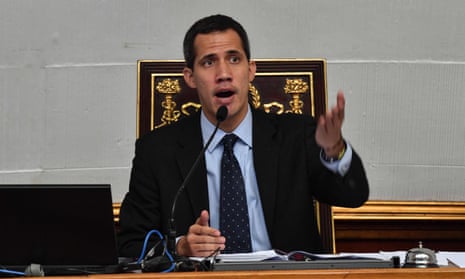Venezuela’s supreme court has imposed a travel ban and financial restrictions on self-declared interim president Juan Guaidó, including freezing his bank accounts.
On Tuesday, the political crisis deepened as the country’s attorney general ordered an investigation into the opposition leader, who last week declared himself interim president in a rare challenge to the incumbent, Nicolás Maduro.
Tarek Saab, a Maduro loyalist, announced that Juan Guaidó – who has received the backing of the US and other regional powers including Brazil and Colombia – would be investigated over his supposed role in “serious crimes that threaten the constitutional order”.
Hours earlier the US tightened the screws on Maduro by announcing sweeping sanctions against the country’s state-owned oil company PDVSA in what experts said was an attempt to economically asphyxiate his regime.
A series of anti-Maduro demonstrations are due to take place on Wednesday in Caracas, the capital, and across the country.
Speaking to Russian news agency RIA on Wednesday morning, Maduro said he was ready for talks with the opposition, with the participation of international mediators.
“I am ready to sit at the negotiation table with the opposition for us to talk for the benefit of Venezuela, for the sake of peace and its future,” he said. Maduro said the US sanctions were one of US national security adviser John Bolton’s “craziest” ideas and that he would emerge the victor in the standoff.
Earlier, Guaidó appeared to take the threat of imprisonment in his stride. He said: “We are here, we will keep acting and working to confront the humanitarian crisis.”
Bolton denounced the “threats” from Saab – who he described as the “illegitimate former Venezuelan attorney general”.
“There will be serious consequences for those who attempt to subvert democracy and harm Guaido,” Bolton tweeted.
José Miguel Vivanco, the Americas director of Human Rights Watch, said the move had been expected: “The only question, given the domestic and international support for Guaidó, is if the Maduro dictatorship is able to really flex its muscles and sideline Guaidó like it has with previous opposition leaders.”
Maduro’s government has long sidelined or arrested figureheads of movements that threaten his power, such as Guaidó’s mentor Leopoldo López, currently under house arrest after organising protests in 2014. Others leaders have gone into self-imposed exile.
Protests that began on Monday last week were met with brutal repression, with the UN human rights office reporting that security forces in Venezuela had detained nearly 700 people last Tuesday, the highest tally in a single day in Venezuela in over two decades.
Between Monday and Saturday last week, more than 40 people were killed, and 850 people were detained overall, including 77 children.
On Tuesday morning, residents of Petare, a sprawling, downtrodden neighbourhood in Caracas, were still reeling from the crackdown launched after tens of thousands took to the capital’s streets on 23 January. Later that night, police and national guardsmen swarmed the streets of Petare, summarily executing suspected agitators, witnesses told the Guardian.
“It was horrible, I was terrified by all the gunfire, so much gunfire,” said one resident who asked not to be named for fear of reprisal. “The police arrived and entered people’s home, and people say they killed people in their own homes who had no criminal records.”
Another resident, who also asked not to be named, expressed solidarity with Guaidó in the face of possible legal troubles. “He has done what no other political has done in about 10 days,” the resident said. “I believe in him and I ask that he helps us change Venezuela.”
However, there was also support for the move against the opposition leader.
“I agree with it because I think that Guaidó is a usurper. He has to respect President Maduro and I think he has to sit down and talk to him and reach an agreement to solve the country’s problems,” said Douglas Flores, 58, a cobbler from the José Félix Ribas neighbourhood in Caracas.
“I think was wrong to proclaim himself president and although I do not judge him, I think he should apologize to President Maduro. He was re-elected and that must be respected. We must respect what the constitution says.”
Guaidó has said he was aware of the consequences of standing up to Maduro, but said he was not fearful.
“I am more afraid of continuing to live in this situation of uncertainty and chaos,” he told the Guardian in an interview last Saturday. “I always think of my daughter when people ask me this, and I have to say my biggest fear is seeing her grow up thinking that this situation is normal. It is not normal and we need to leave the chaos behind.”
